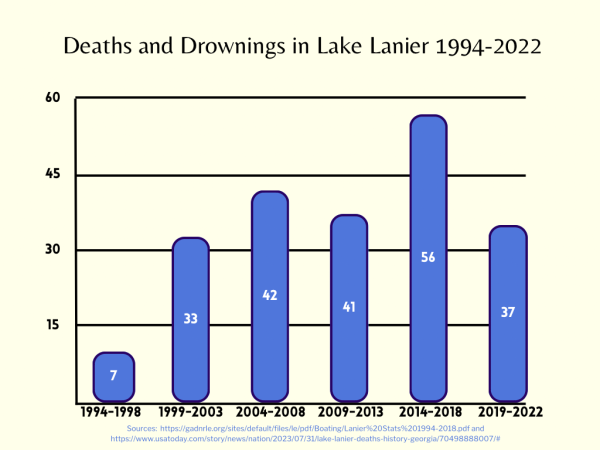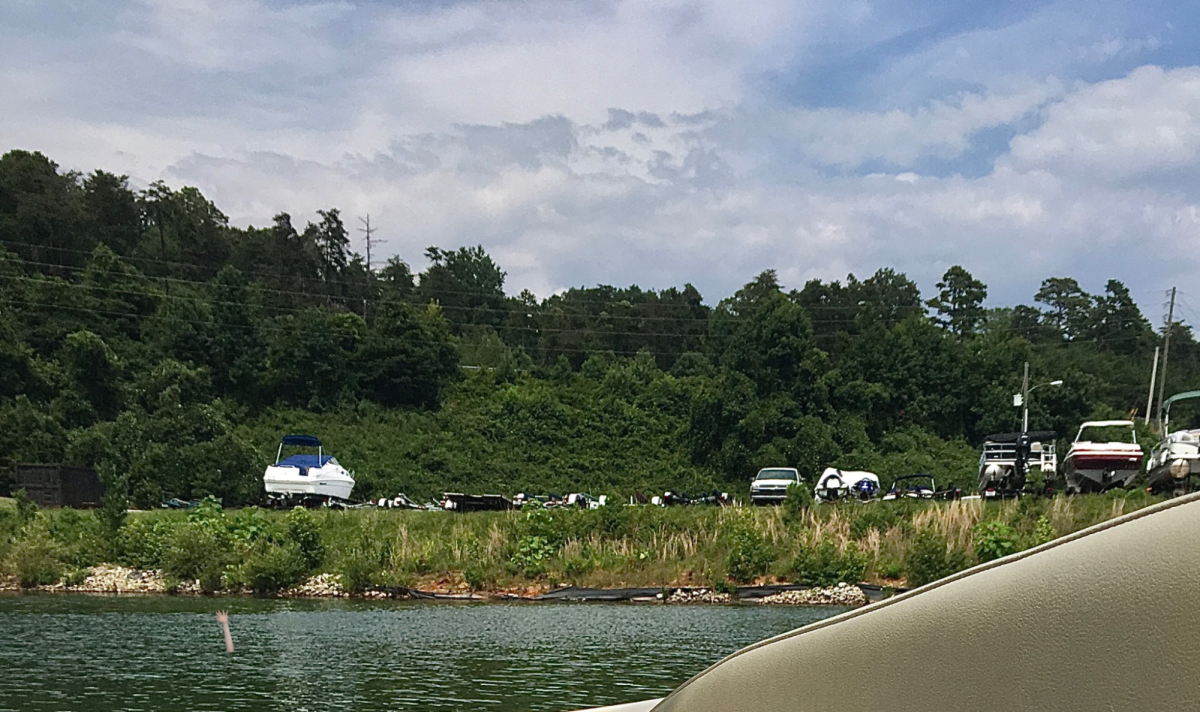While stories of Loch Ness monsters, sirens and Kraken haunt international waters, a Northern Georgia suburb surrounds a lake filled with superstitions. Lake Lanier, located roughly 55 miles from North Cobb High School, holds a disproportionate death toll and an eerie history, leading much of the local population to avoid, and even fear it. Due to its lousy reputation, history of drunken incidents and poor upkeep, The US Army Corps should adjust its operations to negate the risks of visiting or draining it. Regardless, the lake continues to garner around 10 million visitors annually.
The U.S Army Corps of Engineers built the lake in 1956 with the goals of flood control, power generation and most infamously, recreation. Before the construction of the lake, however, the land bore the town Oscarville, Georgia. Although the town now lies beneath the lake, it accumulated a horrible history of its own before its inundation. Oscarville reportedly homed a majority African American population for much of its existence, however, the year 1912 created history in Forsyth County due to what historians describe as racial cleansing. Following the alleged rapes of two white women, one of whom died of injuries related to the crimes, the white population swiftly accused three African American men of the offenses. Though now believed innocent, the white population killed each of the men, one was lynched and the other two were convicted and hung after a short trial. Not long after, the white population began attacking African-American-owned businesses, churches and homes. Much of the African American population in the county fled due to force, leaving their lives behind. This history, reminiscent of Harper Lee’s “To Kill A Mockingbird”, furthers the sinister ambiance of Southern Gothicism in Lake Lanier’s area.
Although the majority of the population and marked graves in the area relocated prior to the lake’s construction, beliefs circulate that unmarked graves remain under the waters. This combines with allegations of old Native American burial sites in the area to make people fear the hauntingly disrespected land.
“One, I don’t like lakes just because you can’t see what’s underneath you it’s like dark and it’s kinda gross, and two, I’m pretty sure there are horror stories of it being built on a graveyard or something, I don’t know, dead bodies in it is all I‘ve heard,” senior Caylin Dyal said.
This history, in conjunction with the approximated 700 lake-related deaths since its establishment, leads travelers and locals alike to spread both folklore and truths regarding the lake’s deadly reputation. During the week of July 31, Leonardo Martinez, Thomas Milner and Tracey Stewart died in the lake; two lost their lives by drowning and the other likely due to electrocution. While drowning and getting electrocuted in water occur regularly in lakes, the fears and stories spread about Lake Lanier doom the fatalities to a fate of whispered campfire stories. One such story, referred to as “The Lady of the Lake,” finds its base in the death of Susie Roberts in 1958, when she lost control of her car and crashed into Lanier. Since the incident, people in the area occasionally report seeing a woman wandering without her hands in a blue dress.
“I’d rather go somewhere that doesn’t have conspiracy theories than that place because one conspiracy theory that stands out to me is the fact that there are dead people just floating at the bottom of that lake… just why even go there if you don’t have to?” Dyal said.
Despite the fear associated with the lake, around 10 million people continue to visit annually. They come to swim, boat, and relax in the lake. It is cheap and holds the potential for enjoyment for people who feel unbothered by the tales associated with it. Unfortunately, the lake’s history does not stand as the only aspect that wants change. It faces both pollution and irresponsible boating practices that contribute to the absence of safety for visitors.
The actions of its visitors likely deserve the blame. From 1999 to 2018, the Department of Natural Resources (DNR) charged about 50 Boating Under the Influence (BUI) instances. This number tends to pick up around holidays such as July 4, as a higher number of people spend time on the lake with alcoholic beverages. The lake may curb its tendency to attract these decisions through the creation and enforcement of an alcohol prohibition rule, currently lacking beyond the illegality of operating a boat while drinking or drunk.
Additionally, the overall upkeep of the lake lacks consistency and quality. The Georgia Water Coalition and others consider Lake Lanier the dirtiest lake in Georgia due to its high levels of water pollution, meaning the body of water likely lacks safety for those who swim in it. Its poor cleanliness means trash could catch or injure swimmers, or they could unintentionally swallow the polluted water. Either of these situations risks contributing to the death and injury toll of the lake.
The US Army Corps likely will not drain the lake due to the energy it generates and the flooding it diminishes. Regardless, visitors of the lake can make an effort to reduce the waste they create there and dispose of that waste properly while staying sober when operating boats. Those who do not visit but still want to make a change can contact the Corps of Engineers Lake Lanier Operation Management Office or the Lake Lanier Association with complaints, suggestions or other reports. Time can not reverse the deaths or sacrifices of folks in and around the infamous lake, but future actions can prevent innumerable tragedies moving forward.

















Anthony Roberts • Aug 29, 2023 at 8:07 PM
I definitely know the story of the lady of the lake because she was my grandmother. My dad told us many stories about his mom, and I recall people in the past saying she wasn’t dead because they saw her in this or that state. When they found her I remember calling the ones I remembered and asked them if they still say that they saw her
Rebecca Zavala • Sep 8, 2023 at 1:36 PM
Thanks for the share; and thanks for reading The Chant!